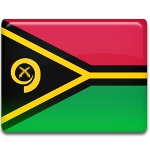Independence Day in Vanuatu Date in the current year: July 30, 2026
 The Republic of Vanuatu celebrates its Independence Day on July 30. It is a public holiday that commemorates the country’s independence from the United Kingdom and France in 1980.
The Republic of Vanuatu celebrates its Independence Day on July 30. It is a public holiday that commemorates the country’s independence from the United Kingdom and France in 1980.Vanuatu is an island nation located in the South Pacific Ocean. The archipelago belongs to Melanesia, along with Solomon Islands, Fiji, Papua New Guinea, New Caledonia, and part of Indonesia.
The islands were originally inhabited by Melanesian people, who first came here over 3,000 years ago. In 1606, a Spanish expedition led by the Portuguese explorer Pedro Fernandes de Queirós visited the largest island and named the archipelago the Southern Land of the Holy Spirit (La Austrialia del Espiritu Santo), believing they had arrived in Australia. The largest island is still named Espiritu Santo.
The Spanish tried to establish a settlement, but it was short-lived, and Europeans didn’t return to the archipelago for over 150 years. French explorer Louis Antoine de Bougainville rediscovered the islands in 1768 and named them the Great Cyclades after an island group in the Aegean Sea. In 1774, the archipelago was visited by British navigator Captain James Cook who named it the New Hebrides.
Both nations were interested in colonizing the islands. Missionaries (both Protestant and Roman Catholic) and settlers began to arrive on the islands in the 19th century. At first, they established cotton plantations, but after the collapse of international cotton prices they switched to other crops, such as bananas, cocoa, coconuts, and coffee.
At first, the majority of the islands’ population was made up of British subjects who had arrived from Australia, but in the 1880s, French subjects became the majority. In the early 20th century, the British were outnumbered by the French by two to one.
In 1906, France and the UK reached an agreement and began to administer the New Hebrides jointly, establishing the British-French Condominium. It was a unique form of government because each country imposed a separate governmental system, and the only touch point was a joint court.
The rise of nationalism in the New Hebrides was triggered by the arrival of Americans during World War II, who impressed islanders with their relative wealth and informal habits. In the 1960s, there was a disagreement between Britain and France concerning the decolonization of the islands: British wanted to let the New Hebrides go, whereas France was afraid that their independence would make New Caledonia want to split, too.
In the early 1970s, the islanders established the first political party. Originally named the New Hebrides National Party, it was renamed the Vanua’aku Party in 1974. Amid the brief Coconut War, the New Hebrides declared independence on July 30, 1980 as the Republic of Vanuatu.
Vanuatu Independence Day is widely celebrated throughout the country. The biggest celebrations take place in Port Vila, the capital of Vanuatu. The festivities include flag raising ceremonies, a military parade in Independence Park, outdoor performances, traditional dancing, and sporting competitions, such as yacht and canoe races in the harbor.
- Category
- Public Holidays
- Country
- Vanuatu
- Tags
- Independence Day in Vanuatu, holidays in Vanuatu, public holidays, national holiday